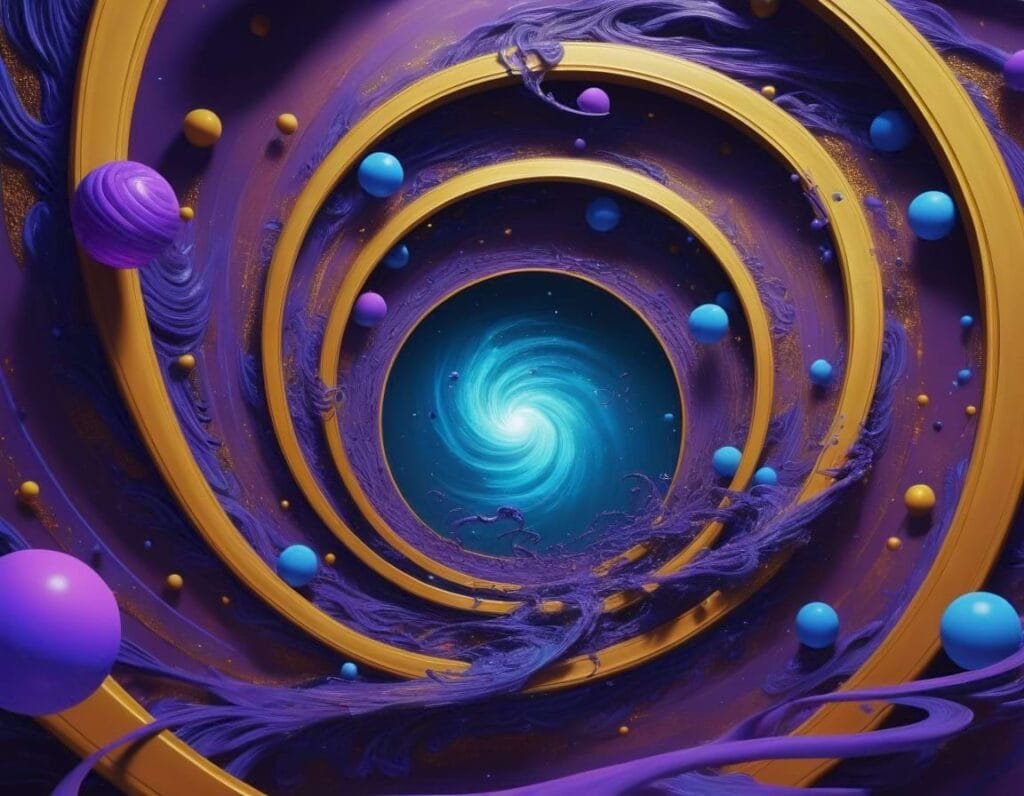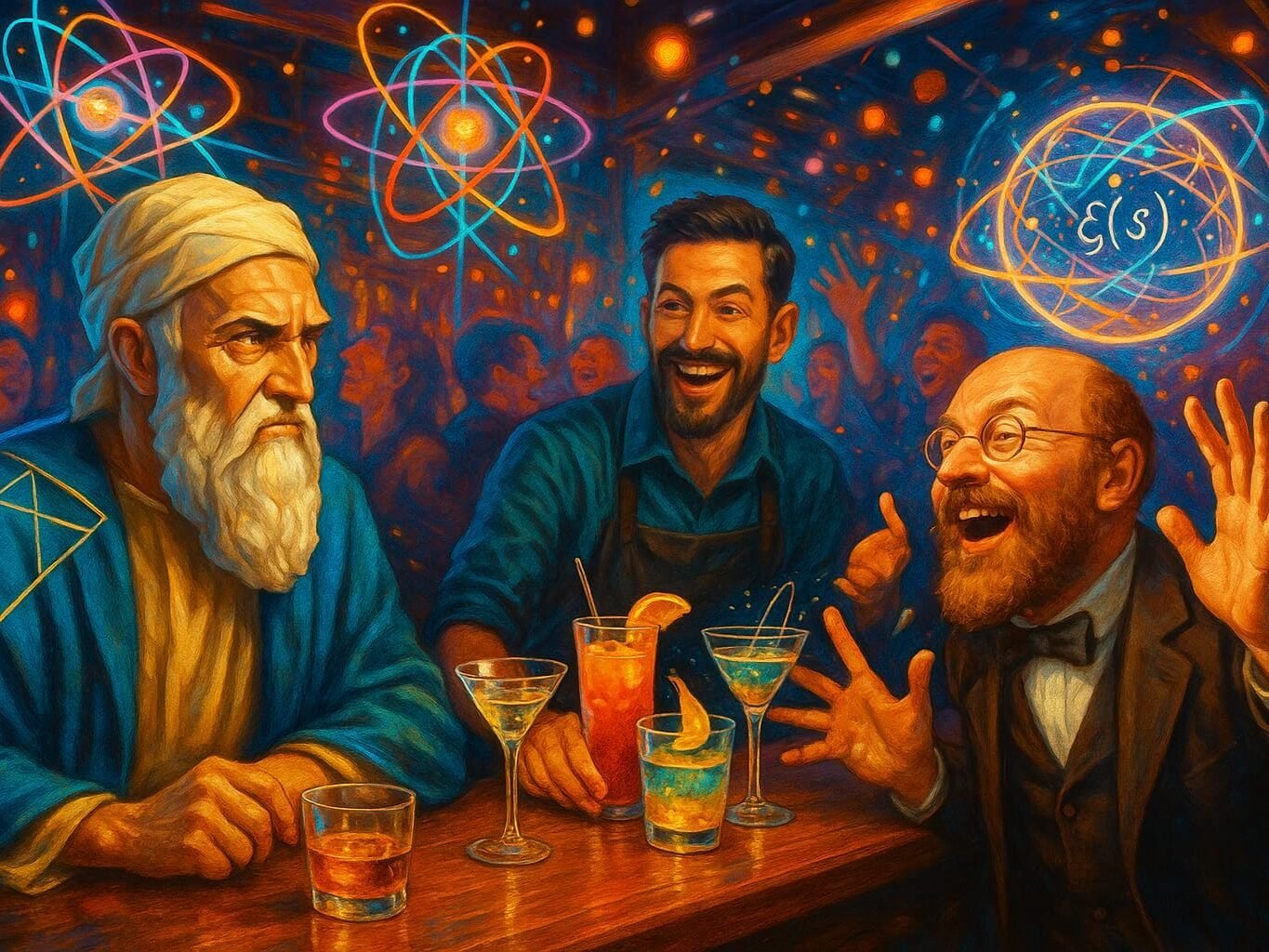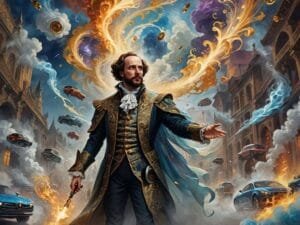Table of contents
Riemann and Euclid stroll into a bar, their geometries clashing like non-commuting operators. The bartender, a quantum computing whiz, says, “Drink, fellas?” Riemann, juggling his zeta function, declares, “I’ll have a superposition of every cocktail—entangled with a twist!” Euclid, rolling his eyes, grumbles, “Just a straight whiskey, no quantum nonsense warping my plane.” The bartender grins, “Watch it, Euclid—this bar’s bill collapses when you measure it!” Riemann winks, “No worries, Euclid, we’ll converge our sums and teleport the tab to a parallel universe!” The bar roars, their laughter decohering into quantum chaos.
And now a bit more serious
Did you like that joke? High nerd score and low humor bar? We might just become friends, then. 😊 And hopefully it’ll put you into a forgiving mood when I tell you something about my first book, Existential Rationalism (2021). It isn’t my most popular book, but still, thousands of copies were sold and Kindle and Audible pages were read and listened to.
In Existential Rationalism, I celebrate my nondual awakening as a symbiosis of nondualism and reason, supported by myriad arguments. One of them is a case against the viability of quantum computers. But I was wrong about them. Entirely, embarrassingly so.
Two wrongs don’t make a right
I wanted them to prove something larger—something about the foundations of science. I believed the orthodox Copenhagen interpretation of quantum mechanics was wrong and that a Riemann surface merely described probabilities, not the real world. The former still stands, but the latter not: Quantum phases can be controlled with remarkable precision, for example through what’s known as quasi-energy in Floquet qubits. This intriguing fact points toward as-yet-unknown deterministic phenomena that could underlie quantum probabilities. Such a possibility directly challenges the orthodox Copenhagen view, which categorically denies any underlying determinism.
While dualistic scientists may dismiss this as a metaphysical or even unscientific concern, within a nondualistic framework, it becomes central. By rejecting the notion of a mind-independent reality, nondualism crowns reason as the arbiter of science. And the very structure of rational inquiry—rooted in the principles of identity, non-contradiction, excluded middle, and sufficient reason—depends on the assumption of a deterministic order beneath appearances.
I thought I saw deeper because of the nondual awakening I had experienced. But it wasn’t me who woke up. It was something before the conception of space and time, and my self—as a working title for this precognitive existence—did what it could to make sense of what had happened. It did its best.
I was thrilled, inspired. Wanted to share what I had seen and help others see it too. But I didn’t have the skills—neither the words nor the understanding. And so I failed. People around me couldn’t see what had been shown to me.
Now I realize this is common. Everyone who’s had this kind of experience seems to go through the same thing. You can’t make someone see what can only be revealed by … the unspeakable.
And yes, I was vain. My ego wanted to be seen and heard. So I overstepped and over-shouted myself. I wanted to explain why nonduality matters so deeply. Something dramatic could carry this message, so I turned to quantum computers.
I just couldn’t believe they could work because I didn’t understand their principles. And I assumed others were deceived because they lacked nondual recognition: a convenient conflation. But two wrongs don’t make a right: Just because the world is nondual and the ultimate truth is beyond conceptual grasp doesn’t mean that we have to content ourselves with the apparent Euclidean form in which the world presents itself.

So I had bitten off more than I could chew. Because quantum computing is possible—at least in principle. I just didn’t fully appreciate the physics.
The Riemannian cracks of spacetime and the quantum world
As I write this in 2025, I find myself—echoing Wolfgang Pauli—misunderstanding quantum mechanics at a deeper level. The journey has been strange and beautiful. What once looked like a clean, Euclidean world now reveals itself as something richer: curved, folded—Riemannian.
I’ve come to appreciate Plato in a new light: How he urges us to use reason and geometry to move beyond the flickering shadows toward the true sun. He who sees with the eyes of the spirit knows that the shadows are not the truth, but the veil.
So what about Existential Rationalism? Should you read it?
That’s up to you.
It’s imperfect. I gave it my utmost, but there may still be inaccuracies. I’m just someone who writes to learn—someone who finds out what he doesn’t know by putting thoughts on the page. To me, sincerity is the starting point of originality, creativity, and insight. And I still believe the central discovery here stands firm: that nonduality, the all-encompassing truth, resonates deeply with reason.
Whatever speaks through this book—it wasn’t just me. And what it showed me was the discovery of a lifetime. I don’t regret following it unconditionally, as I still do today. These words of Plotinus, later recognized as the founder of Neoplatonism, encourage me:
Let him who can, arise, withdraw into himself, foregoing all that is known by the eyes, turning away forever from the material beauty that once made his joy … he must know them for copies, vestiges, shadows, and hasten away towards That they tell of.
As for the physics, I’m exploring new ways to express the nonduality of quantum mechanics. Nothing fascinates me more than the nature of our indivisible world. And hidden in the Riemannian cracks of spacetime—and in the quantum real itself—are even more compelling pointers to that truth.
In the meantime, maybe this imperfect beginning of a journey I started nine years ago can help or inspire you in ways I can’t fully express.
—Marcel Eschauzier, May 2025
You can support Marcel’s work , find gifts, and amp up your style at Marcel’s Booktique.
His books—in paper, pixel, and audio—can also be found at Amazon and other select retailers.
Looking for mindful & funny spiritual gifts, gear, deco, or gadgets? Why not check out the affordable Amazon Merch custom designs by Simply Nondual!
Share this article:




